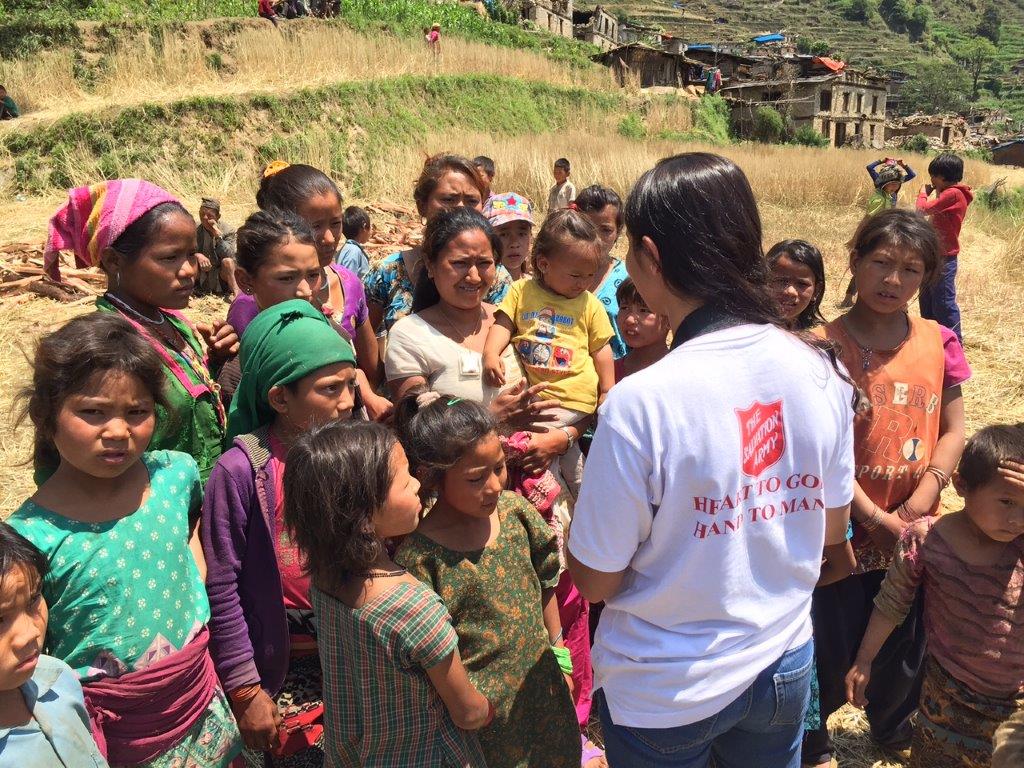Six Months Later: Nepal Emergency Response Turns to Long-Term Recovery

The 7.8-magnitude earthquake that rocked Nepal on April 25 left more than 8,500 dead and devastated the lives of more than 2.8 million people. Hundreds of thousands of people are estimated to be homeless or living in makeshift shelters.
Over the last six months and well before the earthquake struck, The Salvation Army has been serving the Nepal community.
Strengthened by donors and partnerships with Mountain Child, Child Heaven, Child Nepal, Powerful Hands, and Volunteers Initiative Nepal (VIN), The Salvation Army disaster recovery team has so far served over 22,000 households with items such as food, tarps, tents, tools, hygiene items, cleaning supplies, and educational stationary. The Salvation Army also constructed septic tanks and toilets for camps; managed refugee camps; provided thousands of quilts and blankets; and aided the rebuilding of temporary learning centers and houses, which are now critical due to impending winter weather.
According to the United Nations, earthquake-affected communities living at high-altitude isolated areas are projected to suffer the most impact from the change of seasons.
“By God’s grace, The Salvation Army’s longtime presence in Nepal means our services will not end,” said Lieutenant Colonel Thomas Bowers, National Secretary of The Salvation Army World Service Office (SAWSO). “We are dually focused on meeting immediate needs while strategizing long-term relief projects that will support and sustain these communities in the years to come.”
The earthquake ravaged 591,647 homes and 35,986 classrooms in and around Kathmandu. Funding from SAWSO supported the development of temporary housing and learning centers.The Salvation Army also distributed approximately 3,700 tarps and 881 tents to community members needing covered living space and temporary learning spaces while homes and schools are reconstructed.
Looking ahead, The Salvation Army is forming a project team to work alongside the organization’s International Emergency Services team on the ground to implement long term recovery projects that would provide health, education and livelihood support. Six new long-term projects are already in preparation.
"We extend our heartfelt thanks to those who have prayed for and donated to The Salvation Army and its partners throughout the last six months.” Bowers said. “Your gifts are blessing, supporting, and motivating the Nepali community as they journey toward full restoration.”
For those who wish to give, The Salvation Army has set up a designated fund for relief efforts in Nepal.* To give, visit salar.my/Nepal or call 1-800-SAL-ARMY (1-800-725-2769). Check donations to Salvation Army World Service Office (designate “Nepal Earthquake”) can be sent to:
International Relief Fund
P.O. Box 418558
Boston, MA 02241-8558
In-kind donations are not being accepted.
***
About The Salvation Army World Service Office (SAWSO)
SAWSO is committed to working hand-in-hand with local communities to help people who face challenges every day in countries around the globe. Created in 1977 as an independent 501(c)(3) to support the ministry of The Salvation Army, SAWSO has been strengthening global communities in need for nearly 38 years. SAWSO supports The Salvation Army’s impressive global footprint in 127 countries, developing long-term community-driven solutions to issues in the areas of Community Health & HIV Prevention, Livelihood & Empowerment, Anti-Human-Trafficking, Disaster Relief & Recovery, and Education. To learn more, go to sawso.org.
About The Salvation Army
The Salvation Army, an evangelical part of the universal Christian church established in London in 1865, has been supporting those in need in His name without discrimination for 135 years in the United States. Nearly 30 million Americans receive assistance from The Salvation Army each year through a range of social services: providing food for the hungry, relief for disaster victims, assistance for the disabled, outreach to the elderly and ill, clothing and shelter for the homeless, and opportunities for underprivileged children. For more information, visit SalvationArmyUSA.org. Occasionally, conditions in the field may alter relief activities. If this occurs, The Salvation Army will direct funds to our International relief efforts in the region.


